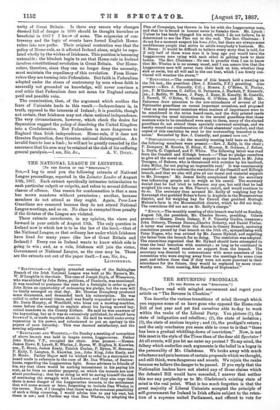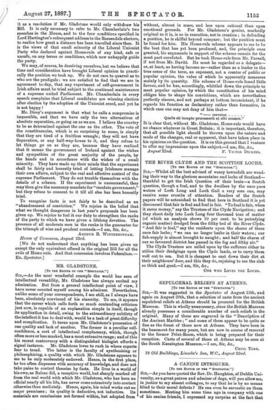THE RETURNING PRODIGALS.
[To THE EDITOR Or IRS "SDECTATOS"]
Sust,—I have read with mingled amusement and regret your article on " The Reverse in Cheshire."
You describe the various transitions of mind through which you suppose some of ns have gone who opposed the Home-rule Bill of last year and yet find ourselves able to-day to work within the ranks of the Liberal Party. You picture (1), the state of indignation and rebellion; (2), the state of isolation ; (3), the state of anxious inquiry ; and (4), the prodigal's return ; and the only conclusion you seem able to come to is that "there has been a gradual whittling-down of conviction." Now, is not this moat in the style of the Times than of the dear old Spectator 1 At all events, will you let me enter my protest P To my mind, the fallacy which underlies such arguments is the belief in a bogey in the personality of Mr. Gladstone. We broke away with much reluctance and painbecause of certain proposals which we thought, and still think, were dangerous and unsafe. We rejoin the ranks because we believe the danger to be passed. If you reply that the Nationalist leaders have not abated any of those claims which the defeated Bill would have conceded, I answer that neither this nor any perplexity as to Mr. Gladstone's existing state of mind is the real point. What is too much forgotten is that the great majority of Liberal Unionists accepted the principle of self-government for Ireland in Irish affairs subject to the reten- tion of a supreme united Parliament, and offered to vote for
it as a resolution if Mr. Gladstone would only withdraw his BilL It is only necessary to refer to Mr. Chamberlain's two speeches in the House, and to the four conditions specified in Lord Hartington's subsequent address to the Rossendale electors, to realise how great a distance has been travelled since then. It is the views of that small minority of the Liberal Unionist Party who declared against Home-rule of any kind, safe or unsafe, on any terms or conditions, which now unhappily guide the party.
We may, of course, be deceiving ourselves, but we believe that time and consideration have brought Liberal opinion to practi- cally the position we took up. We do not care to quarrel as to who are the prodigals ; we are satisfied to find that we are in agreement to-day, that any experiment of self-government in Irish affairs must be tried subject to the continued maintenance of a supreme united Parliament. Mr. Chamberlain in every speech complains that Liberal candidates are winning election after election by the adoption of the Unionist creed, and yet he is not happy !
Mr. Dicey's argument is that what he calls a compromise is impossible, and that we have only the two alternatives of absolute separation, or going on as we are. I believe the country to be as determined against the one as the other. The vote of the constituencies, which is so surprising to some, is simply that they are tired of a fruitless wrangle; they will not have Separation, or any half-way-house to it, and they refuse to let things go on as they are, because they have realised that it means the government of Ireland against the wishes and sympathies of the great majority of the people, by the hands and in accordance with the wishes of a small minority. They have made up their minds that the experiment shall be fairly and honestly tried of letting Irishmen manage their own affairs, subject to the real and effective control of the supreme Parliament. They do not trouble themselves with the details of a scheme. If the experiment is unsuccessful, they may then give the necessary mandate for "resolute govern ment ;" but they refuse to consent to it till all else has been honestly tried.
To recognise facts is not fairly to be described as an "abandonment of conviction." We rejoice in the belief that what we thought dangerous in last year's proposals has been given up. We rejoice to feel it our duty to strengthen the ranks of the party to which we have given a lifelong devotion. The presence of all moderate men in the ranks is the guarantee for the triumph of wise and prudent counsels.—I am, Sir, &c., ARTHUR B. WINTERBOTHAM. House of Commons, August 23rd.
[We do not understand that anything has been given up except the only equivalent offered in the original Bill for all the evils of Home-rule. And that concession involves Federalism.— En. Spectator.]



































 Previous page
Previous page